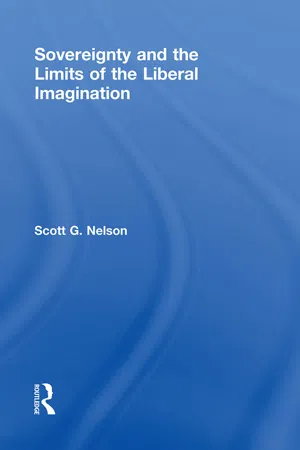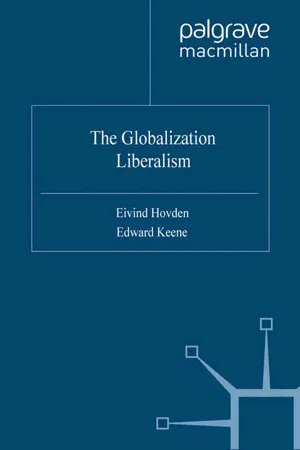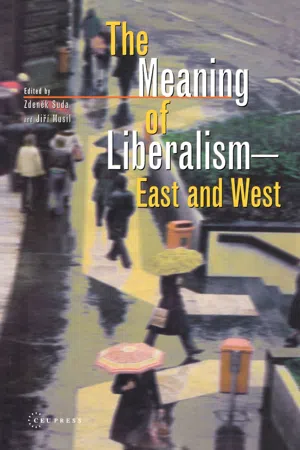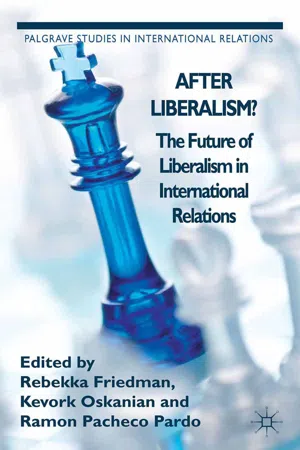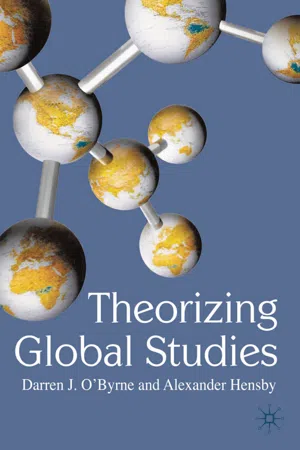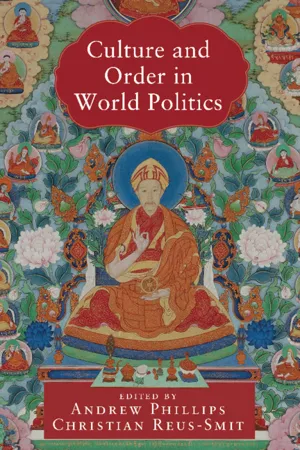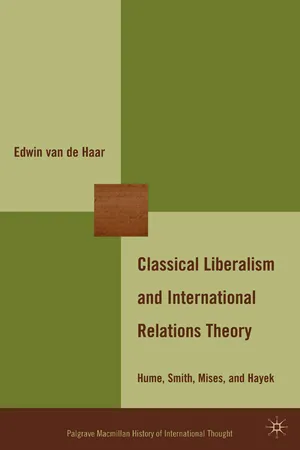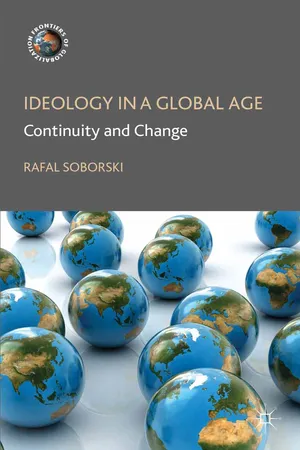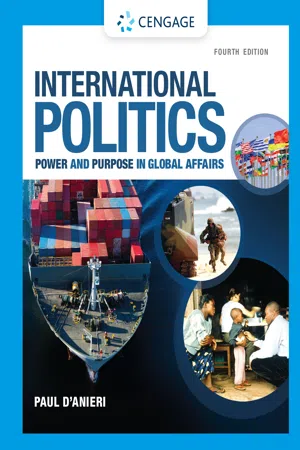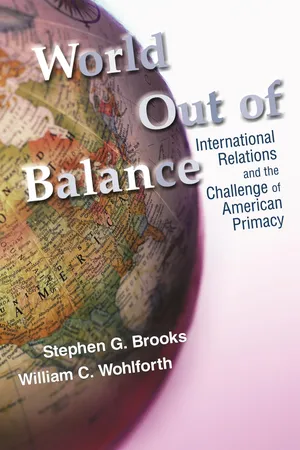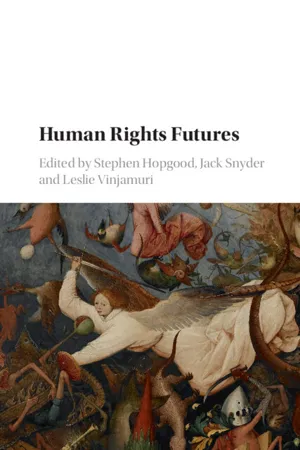Politics & International Relations
Liberalism and Globalisation
Liberalism and globalization are interconnected concepts in the realm of international relations. Liberalism emphasizes individual rights, free markets, and international cooperation, while globalization refers to the increasing interconnectedness of the world through economic, political, and cultural exchanges. The spread of liberal ideas and policies has been closely linked to the process of globalization, shaping global governance and economic systems.
Written by Perlego with AI-assistance
Related key terms
1 of 5
11 Key excerpts on "Liberalism and Globalisation"
- Scott G Nelson(Author)
- 2009(Publication Date)
- Routledge(Publisher)
3 Political liberalism and international relations Globalization as necessity: a problematization Globalization is a term in wide circulation in the West that variously refers to a process of making One, of inter-linking disparate and once well walled-off spheres of knowledge, labor, production, and distribution. It is a term used by some to denote dramatic reductions in transaction costs on the flows of capital, commodities, labor, services, and information in the networking global economy, the soon-to-emerge globalopolis. It imagines a world which itself may one daydream of a unique nationalism all its own, a world that will have thoroughly transfigured politics and community and, indeed, reconstituted history, progress, and human freedom. The term, in brief, invokes a series of processes inextricably bound to capitalism, liberalism and (late) modernism. Few deny the centrality of these three “-isms” to globalization’s “processes” – indeed, to its very naming. And few deny the power of market liberalization that seems to be everywhere scripting new conceptions of politics and community, solidarity and collective action, autonomy and agency. But the very conditions of capitalism, liberalism and modernity are only vaguely acknowledged as necessary to the processes of globalization – to its naming, yes, but also to ongoing articulations of political community which are producing new ethico-political relations- eBook - PDF
- E. Hovden, E. Keene, E. Hovden, E. Keene(Authors)
- 2016(Publication Date)
- Palgrave Macmillan(Publisher)
Part II Globalization and Liberalism in Contemporary International Relations 4 Liberalism at the Global Level: Solidarity vs. Cooperation Richard Falk Liberalism at the international level has always been vague and ambiguous. It seems to have been initially associated with Woodrow Wilson's championship of political democracy, the related idea of self- determination and the possibility of a more peaceful and morally acceptable world in which security is managed by collective procedures within international institutions. This Wilsonian orientation, which is generally identifiable by support for a stronger United Nations, persists to a substantial extent, and has often been called 'liberal international- ism'. It tends to be combined with a projection onto the global stage of such domestic features of a liberal democratic state as elections, separa- tion of powers, due process, human rights, and the Rule of Law. 1 The liberal orientation extended to international-relations often advocates gradual increases in international cooperation by way of institutional arrangements. This international reliance on liberalism in its domestic setting is rarely coupled with a long-range comprehensive plan that culminates in the establishment of a liberal global state. 2 A second, less understood, yet complementary approach to liberal internationalism has been persuasively traced back recently to Immanuel Kant, especially his contention that liberal states, loosely organized into a cooperative league, are unlikely to wage war against one another, and thus create a zone of peace that could, in theory, be enlarged until encompassing the planet. Kant also insisted upon a uni- versal duty of 'hospitality' to strangers and foreigners as a means of inhibiting hostile relations among states and as an encouragement to the growth of global commerce. 3 Yet, the new geopolitics of world order tends to be economistic in the sense of being restructured in accordance with global market forces. - eBook - PDF
- Jiří Musil, Zdeněk Suda, Ji?í Musil, Zden?k Suda, Ji?í Musil, Zden?k Suda, Jiří Musil, Zdeněk Suda(Authors)
- 1999(Publication Date)
- Central European University Press(Publisher)
148 1 THE MEANING OF LIBERALISM which have only recently converted to the laws of the global market. Indeed, it is possible to perceive subtle symptoms of it even in the most advanced societies, with a long historical development behind them; the very ones that cradled liber-alism. So if liberalism appears to be limping everywhere, al-though to different extents, it is because a general and uni-versal discord has taken a firm hold within it. As long as the scales of the economic system and political society were on the same level, however approximately, 5 the two sides of the liberal enterprise maintained a clearly synergetic relation. But today's economy is a global phenomenon, whereas the political communities remain limited by the borders of the state. Economics and politics are no longer on the same level, and they are no longer concentric. As a consequence, the former may very well be of quite a liberal inspiration without the latter necessarily being so. The globalization of the economy has revealed that the apparent twin harmony mentioned above in fact concealed fundamental differences which had not really been perceived previously. Political lib-eralism is not and cannot be simply the homologue of eco-nomic liberalism. ln fact, political liberalism is never entirely reducible to the rational behavior of free individuals, moved only by their relentless pursuit of the maximization of util ity. Liberal political man has, just like anyone else, a crucial need for identity, and in order to explain his political activity accu-rately, it is necessary, if not to substit ute a reasoning in terms of identification for a reasoning in terms of utility, as Alessandro Pizzorno suggests, then at least to try and com-bine the two (Birnbaum and Leca, 1990). - eBook - ePub
After Liberalism?
The Future of Liberalism in International Relations
- R. Friedman, K. Oskanian, R. Pachedo Pardo, R. Friedman, K. Oskanian, R. Pachedo Pardo, Kenneth A. Loparo, Ramon Pacheco Pardo, R. Friedman, K. Oskanian, R. Pachedo Pardo, Ramon Pacheco Pardo(Authors)
- 2013(Publication Date)
- Palgrave Macmillan(Publisher)
In the second section of this chapter, I will therefore try to recapture the core of liberalism by bridging the very divisions that lead to these partial conceptions. To this end, I will return to John Locke’s pre-disciplinary formulation of protoliberal principles, which explicitly theorise the connections between their core aspects and their political dynamics. This Lockean account of liberalism and its political dynamics, moreover, is broadly substantiated by the historical development of liberalism.Viewed through the lens of this alternative concept, recent history shows neither a “rise” nor a “fall” of liberalism. Instead, the shifts that undoubtedly characterise this period simply indicate liberalism’s adjustment to the power political opportunities and constraints provided by the international system. In short, they are shifts in form rather than substance. What comes “after liberalism”, I therefore conclude, is simply a different register of liberalism.Liberalism – DividedDuring the 1990s, a wide range of policies was prominently associated with liberalism. Among them were the liberalisation, deregulation, and privatisation of the international economy, the development of the World Trade Organization (WTO), and the transformation of former communist into capitalist states – in short, neoliberal economic policies. Proactive democracy promotion, as well as the widespread attempt to establish liberal market democracies as solution to failed, conflict-ridden, or even simply authoritarian states played an important role in the foreign policies of liberal states, of NGOs, and of international organisations and institutions, and gave rise to the notion of “liberal peacebuilding”. Liberalism was also associated with the proactive protection of human rights, not least in the form of humanitarian intervention as well as with plans to reform international law and international organisations in accordance with “a world of liberal states” (Clark, 2009; Keohane, 2003; Slaughter, 1995).In contrast to this spread of liberal norms, practices, and institutions, power politics generally associated with realism characterised the prior Cold War period. Capitalism, free trade, and free market principles were confined to the Western sphere of influence and tempered, domestically and internationally, by considerations of political stability. Democracy promotion was equally restricted and generally trumped by power political considerations; hence extensive alliances with authoritarian states and interventions in support of sympathetic rather than democratic regimes predominated. Human rights were generally subordinated to the principle of sovereignty. In short, the “rise” of liberalism was associated with the increase in policies explicitly designed to spread liberal norms, practices, and institutions. And it was the retreat from these policies towards the end of the 1990s and a more explicit turn towards traditional power politics after 9/11 that seemed to indicate a “fall” of liberalism. - eBook - PDF
- Darren J O'Byrne, Alexander Hensby(Authors)
- 2020(Publication Date)
- Red Globe Press(Publisher)
In other words, for the liberal, human rights are essentially synonymous with civil rights. 36 THEORIZING GLOBAL STUDIES What underpins this political liberalism is an inherent individualism, and it is precisely this individualism that gives rise to the two other ‘core’ liberal values – capitalism and democracy. As liberals from Smith onwards have tried to tell us, capitalism as a system is best left to its own devices, away from state interference, which means that, at the level of the individual, I should be free to engage in economic activity, to trade, to invest and to benefit from any gains made from such activities. Locke’s own philosophical anthropology saw humans as essentially enterprising and commercial creatures, competitive yet cooperative. Democracy (which of course was not necessarily a priority among many early liberals, including Kant) emerges merely as an extension of the liberal belief in the primacy of the individual over the state, extending the liberal commitment to civil rights to incorporate basic political rights of involvement as well. Thus, for the liberal, I am a citizen, entitled to a life of privacy left largely untouched by the public realm of law and politics; I am a consumer or producer, a trader in the marketplace which, equally, sits outside the formal political realm; and I am, within that realm, a voter, exercising my power and authority over the state in the fairest (and most individualistic) manner possible. Thus, the model of globalization-as-liberalization is inherently under-pinned by the philosophy of liberalism. Liberalization is the process through which borders between states are being eroded, allowing for an easier flow of capital, goods, ideas and people. - eBook - PDF
- Andrew Phillips, Christian Reus-Smit(Authors)
- 2020(Publication Date)
- Cambridge University Press(Publisher)
It has variously been a ‘map’ illuminating the path to a better world and a ‘survival guide’ to be used in the face of impending global calamity. Liberal internationalism has varied in its vision of how universal or global it is or can be as an order. It has been conceived as a political formation of various shapes and sizes: European, Anglo- American, Western, free world, and global. Liberal internationalism embodies a contested set of ideas and agendas – contested from outside by rival ideologies and political projects, and from within the liberal tradition itself. Despite these shifts and tensions, liberal internationalism has several core ideas that have travelled across the centuries and decades. One is about openness. Trade and exchange are understood to be constituents of modern society, and the connections and gains that flow from deep 10 For a survey of the varieties and historical shifts in the liberal internationalist vision, see Ikenberry 2009. Liberal Internationalism and Cultural Diversity 143 engagement and integration facilitate peace and political advancement. Second, there is a commitment to some sort of loosely rule-based set of relations. Rules and institutions facilitate cooperation and create capaci- ties for states to make good on their domestic obligations. Third, there is a view that liberal international order will entail some form of security cooperation. This might not take the form of alliances or a formal system of collective security, but states within the order affiliate in ways to increase their mutual security. Fourth, there is an expectation that liberal international order will move states in a progressive direction, defined in terms of liberal democracy. The order provides institutions, relation- ships, and rights and protections that allow states to grow and advance at home. - eBook - PDF
Classical Liberalism and International Relations Theory
Hume, Smith, Mises, and Hayek
- Kenneth A. Loparo, Edwin van de Haar(Authors)
- 2009(Publication Date)
- Palgrave Macmillan(Publisher)
In full accordance with the vocabulary of the opponents of classical liberalism, capitalism, and globalization (see chapter 2), he calls it “neoliberalism” and portrays it as the bulwark of the established order with legitimized privileges that uphold inequalities like structural unemployment and social depriva- tion, at the cost of the marginalized in the developing world. In contrast, social liberals are presented as a liberating force promoting the equality of rights. 95 The explanatory power of this bewildering variety of liberalisms in IR is very limited. With classical liberalism they share a concern for individu- als and free international economics. But most liberal IR theories regard humans as rational beings, argue in favor of international governmental organizations, and almost uniformly regard liberalism as a peace theory. All the adjectives used are disentangled from liberal political theory and add to the liberal confusion in IR. Most theorists do not clarify the political philosophy foundations of their theory. At best, like Andrew Williams in Liberalism and War, some names of philosophers are mentioned and some highlights of their work sketched, 96 but not from a political theory perspec- tive. This is an important reason for “the inflation” of the term liberalism in international political theory: if everything is called liberalism, liberalism becomes meaningless. 150 ● Classical Liberalism and IR Theory Conclusion The classical liberal IR theory is a consistent application of the domestic classical liberal elements to the international realm. It has most in common with the pluralist Grotian tradition in English School theory. While all its separate elements need further analysis, it is clear that classical liberalism in IR theory is radically different from the existing forms of liberalism in that field. - eBook - ePub
Ideology in a Global Age
Continuity and Change
- R. Soborski(Author)
- 2013(Publication Date)
- Palgrave Macmillan(Publisher)
5 This way of thinking had been present in classical liberalism far in advance of the neoliberal fixation on globalization and the similarities between classical liberal interpretations and ‘globalist claims’ are not just erratic overlaps but represent an organic continuity. In the next section, I develop my argument by comparing what Steger demarcates as ‘globalism’ with the key concepts of classical liberalism as an ideology that ‘has always been about globalization’ (Young 2002: 173). I substantiate my conceptualization of this set of interpretations as liberal by examining their interaction with the principle of liberty and their compatibility in the context of liberalism’s universalist approach. While the classical liberal concept of globalization is contingent on this ideology’s understanding of liberty and universalism, the meanings of these extremely capacious fundamentals are in turn updated to novel circumstances in the process of classical liberalism’s engagement with the new concept.Classical liberalism: Liberty, markets and globalizationThe broad characteristics of the classical liberal understanding of what liberty is, and why it could, and should, be universalized derive from the socio-historical milieu in which classical liberalism came into being. As a comprehensive political doctrine, classical liberalism emerged in the late eighteenth century. It was an expression of the aspirations of the bourgeoisie, the class that had rejected the rule of absolute monarchs and the unearned privileges of the aristocracy and that was in the process of giving rise to full-blown capitalism. Accordingly, the classical strand of liberalism understands the core component of liberty to be freedom from undue fetters imposed by all overtly non-meritocratic systems of social stratification. This classical liberal concept of liberty has been made to work on behalf of the economic and political priorities of the bourgeoisie and has thus become associated with the functioning of the bourgeois economic system freed from arbitrary feudal obligations.The liberal glorification of the market brings together several threads. The free-market economy is held to be relentlessly efficient and, by implication, the only reliable way to eliminate poverty and destitution. Furthermore, the free market is elevated to the status of a paradigmatic arrangement of any free society, a perfect mechanism not just for the running of the economy but also for the modelling of other spheres of social life. Markets are believed to promote vital moral qualities that are conducive to the ‘good life’ in society. Economic freedom is conceptualized as underpinning political freedom and economic liberalization is said to entail democratization although, as I pointed out earlier, it is important to note that this view tends to be compromised either on the more ‘social’ edge of classical liberalism where emphasis may be shifted towards a different set of prerequisites for democracy (Sachs 2011) or on liberalism’s somewhat ‘conservative’ periphery where the objective of democratization may be de-emphasized altogether (Lal 2000, 2006). What applies to domestic affairs is also upheld with regard to the international stage. Here, the expansion of free markets is posited by classical liberals as the most reliable guarantee of peace and stability of the international system. - No longer available |Learn more
International Politics
Power and Purpose in Global Affairs
- D'Anieri, Paul D'Anieri(Authors)
- 2016(Publication Date)
- Cengage Learning EMEA(Publisher)
72 INTERNATIONAL POLITICS: Power and Purpose in Global Affairs Military capability, economic capacity, and prestige or cultural power are important components. Combining all of these factors in a way that allows researchers to deter-mine which countries are more powerful than others is impossible, yet realist analysis relies on the ability to do so. Realism also tends to ignore other manifestations of power, such as institutional power, “soft” power, structural power, and collaborative power (see Chapter 1). LIBERALISM Political liberalism arose in the eighteenth century and took a practical form when it inspired the American Revolution and was embodied in the U.S. Constitution. Liberal theory took hold more slowly in the international realm than in the United States, but its influence has gradually increased over time. Both international and domestic liberalism were responses to the problem of anarchy that had been set out by theorists such as Thomas Hobbes. Hobbes argued that in order to solve the problem of domestic anarchy, a powerful monarch, the “Leviathan,” was necessary. In the international realm, with a single international “monarch” (a global empire) or world government viewed as impossible, realists argue that anarchy, with all its consequences, is unavoidable. Although liberal theories vary considerably, all share a rejection of the realist notion that the consequences of anarchy cannot be mitigated. Liberal domestic theory centers on the rights (liberties) of the individual. The politi-cal theorist John Locke and later liberals argued, contrary to Hobbes, that individuals could freely join together to form governments that would protect them from anarchy without resorting to authoritarianism. The limitation of state power and the guarantee of the rights of individuals are still the core of liberalism (which, in contemporary usage, is often simply called democracy ). - eBook - PDF
World Out of Balance
International Relations and the Challenge of American Primacy
- Stephen G. Brooks, William C. Wohlforth(Authors)
- 2008(Publication Date)
- Princeton University Press(Publisher)
C H A P T E R F O U R Liberalism, Globalization, and the Constraints Derived from Economic Interdependence L IBERAL INTERNATIONAL THEORY highlights the capacity of interna-tional institutions, domestic politics, and economic interdependence to influence international security behavior. 1 We discuss the role of inter-national institutions in chapter 5, and there is a large literature on the domestic political constraints on U.S. security policy, as discussed in chapter 1. This chapter examines the liberal argument concerning how U.S. security policy is influenced by enhanced global economic interde-pendence—that is, the globalization of trade, finance, and production. Although interdependence is not limited to the global economy, this is typically how liberal scholars operationalize it when discussing its potential influence on security issues. 2 The signature argument that IR scholars advance regarding constraints on foreign policy is that en-hanced economic interdependence changes the degree to which states are open to influence attempts by other states. As David Baldwin em-phasizes, as a state becomes more dependent upon the global economy, it exposes itself to a wider range of economic strategies that can be deployed against it by other states. 3 In recent decades, it is evident that U.S. exposure to economic globalization has increased in the trade, fi-nance, and production realms: U.S. exports as a percentage of GDP rose from just under 5.8 percent in 1970 to slightly more than 11.2 per-cent in 2000; the U.S. outward foreign direct investment (FDI) stock as a percentage of GDP has increased from 7.3 percent in 1970 to 17.1 percent in 2003; and the share of total U.S. long-term securities held by foreigners has increased from 4.8 percent in 1974 to 16.7 percent in 2005. - eBook - PDF
- Stephen Hopgood, Jack Snyder, Leslie Vinjamuri(Authors)
- 2017(Publication Date)
- Cambridge University Press(Publisher)
The drastic curtailment of liberalism’s ambition through the rise of its foreign policy of human rights promotion took it back to the values its belatedly cano- nized founders, Thomas Hobbes and John Locke, had once consecrated for domestic politics alone. They did so out of the belief that the sole plausible goal of politics in the world is the defense of order, perhaps supplemented by protection of personal liberties (and property), rather than the construction of social freedom. In setting their sights so low, today’s liberals have unlearned crucial lessons they once prized about the need to augment and improve liberalism over modern history. They have broken with their own tradition as they pared it down to size. It follows that if human rights advocates were to be true to the entirety of the liberal tradition and adopt the risky attempt to envision global freedom through new and post-imperial means, they would have to abandon their exclu- sionary commitment to a minimal baseline of protection that they gen- erally pursue so single-mindedly. They might even have to marginalize individual rights, as liberals historically did in domestic politics. In recalling what liberalism has been, and how the contemporary international human rights movement breaks with it, this chapter also offers some criticisms of contemporary political science. Today, political scientists, with their empiricist fashions, engage with human rights more for the sake of disciplinary supremacy, and less for the sake of extradisci- plinary relevance. An outsider might well look at human rights discus- sions in contemporary political science, and especially international relations, with great sadness. Human rights have mainly become fodder for prior disciplinary struggles, such as the constructivist war on “realism” or the exclusionary insistence on quantitative methods.
Index pages curate the most relevant extracts from our library of academic textbooks. They’ve been created using an in-house natural language model (NLM), each adding context and meaning to key research topics.
